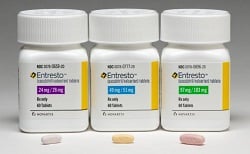 When Novartis ($NVS) was preparing to roll out its new heart failure drug Entresto, market watchers expected big things. After all, the company had run a big outcomes trial showing that the drug beat a standard treatment at keeping patients alive. That sort of survival benefit seemed an ace in the hole for the launch Novartis called its biggest in years.
When Novartis ($NVS) was preparing to roll out its new heart failure drug Entresto, market watchers expected big things. After all, the company had run a big outcomes trial showing that the drug beat a standard treatment at keeping patients alive. That sort of survival benefit seemed an ace in the hole for the launch Novartis called its biggest in years.
But when the sales numbers rolled in for the third quarter, Entresto only accounted for $16 million--and that's mostly from wholesaler stocking.
What's going on? It's partly a story of payer barriers, namely Medicare. With Medicare beneficiaries accounting for 65% of potential Entresto patients, the lack of coverage there has put a major crimp on prescribing. But Novartis expects the Medicare coverage hurdles to fall, for the most part, after Part D's 6-month mandatory block on new meds expires.
But there's more to it than that, Novartis executives admitted during the Q3 earnings call. Cardiologists have been using cheap generics to treat heart failure for years now, and they won't automatically switch to a new, costly drug; Entresto's list price is $4,500 per year. That takes some convincing. And even those doctors already aware of--and sold on--Entresto's benefits aren't likely to push reluctant payers to cover it.
 |
| Novartis pharma chief David Epstein |
"[U]nlike an oncologist or rheumatologist or dermatologist, you haven't had to spend the time and you haven't had to build the office staff that would fight which literally can be hours, days or weeks to try to fight to get a product approved," Novartis pharma chief David Epstein said during the Q3 call. "They're just not used to doing it and psychologically it's even difficult for them to do it."
Entresto has managed to rack up some scripts so far, thanks to doctors who have pushed hard enough, Epstein said. But even after the payer obstacles begin to fall, Novartis has some work to do with cardiologists. The company figures its field reps will have to concentrate on those specialists for at least half of 2016 to get them "fully on board," Epstein said. Only after that would the company mount a primary-care sales-rep push.
"[W]hat we need to do is to fully educate these physicians to create the sense of urgency to move patients from an ACE inhibitor and ARB that they've been using for many years to a new drug," Epstein said during the call. Help getting prior authorization from payers might be necessary, too.
Meanwhile, Novartis knows that the old "ask your doctor" meme is a cliche for a reason: it works. "[W]hen a patient or caregiver actually asks the doctor for the drug, they're much more likely to get it," Epstein pointed out. "So, we need to make sure that patients and caregivers are hearing about the medicine as well."
That means DTC marketing and advertising, which drugmakers forgo for a new product's first 6 months on the market, so the earliest a campaign could begin is January. Heart failure patients may be ready to hear it; according to Treato, social media is buzzing with patients talking about the new drug.
But Novartis' doctor detailing and DTC promos could still fall short if influential physician groups don't give Entresto a strong spot in treatment guidelines. New heart failure treatment protocols are expected next year, with European guidelines likely to come first. Bernstein & Co. analyst Tim Anderson contends that those guidelines are "critical" to Entresto's success. For the new drug to hit its stride, the guidelines need to recommend it ahead of the generics that are the current standard of care, ACE inhibitors and angiotensin receptor blockers, he says. Novartis has pegged Entresto at $5 billion in peak sales.
Novartis says favorable treatment guidelines will be "helpful" but not crucial. Educating doctors about the drug--and other treatment-related data, such as numbers showing that the first complication many heart failure patients face is sudden death, Epstein said--comes first, as do consumer marketing and payer talks. "We need to activate patients and caregivers to ask for the drug and we have to get through the reimbursement hurdles, most of which will probably happen before the guidelines come out," Epstein said.
In any case, Entresto's launch is likely to be eclipsed by a fellow new Novartis product--the psoriasis treatment Cosentyx--for a while. "[T]he uptick for Entresto will clearly be slower than it is for Cosentyx, given the dynamics," Epstein acknowledged. "On the other hand, we have very good expectations about the ultimate profile of the product and being able to hit the peak sales forecast that we shared."
- read the Q3 transcript at Seeking Alpha
Special Report: The 25 most influential people in biopharma in 2015 - David Epstein - Novartis